Humans
Sign up for our newsletter
We summarize the week's scientific breakthroughs every Thursday.
-
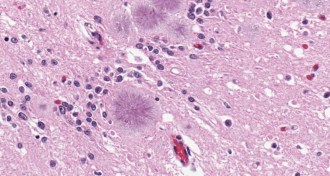 Health & Medicine
Health & MedicineNew tests screen for lethal prion disease
Urine and nasal swabs can detect small amounts of the abnormal prions that cause Creutzfeldt-Jakob disease.
By Nsikan Akpan -
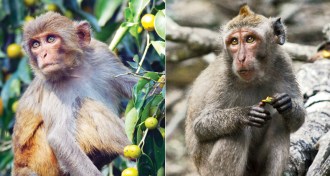 Life
LifeAirborne transmission of Ebola unlikely, monkey study shows
No evidence found of macaque monkeys passing deadly virus to each other.
-
 Health & Medicine
Health & MedicineTwo American Ebola patients given experimental therapy
The two American missionaries who contracted Ebola in Liberia have been treated with an experimental therapy that consists of antibodies to fragments of the deadly virus.
-
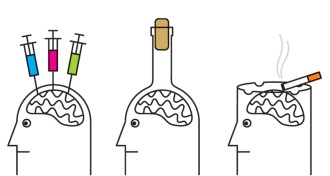 Psychology
PsychologyAddiction showcases the brain’s flexibility
People with substance abuse disorders are not just chasing a high. Their brains are adapting to the presence of drug, evidence of humans’ impressive neural plasticity.
-
 Anthropology
Anthropology‘Hobbit’ may have been human with Down syndrome
A reanalysis of a skull scientists used to argue for the hobbit species Homo floresiensis suggests the woman was a modern human with features of Down syndrome.
-
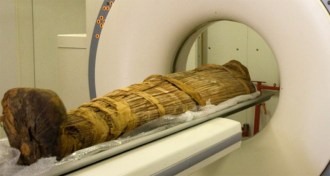 Health & Medicine
Health & MedicineMummies reveal hardened arteries
Mummy studies suggest heart disease is an ancient malady, not just the product of modern diets and sedentary lifestyles.
-
 Health & Medicine
Health & MedicineSeven facts and a mystery about hand, foot and mouth disease
Hand, foot and mouth disease is a viral illness that most kids get before age 5. Several different viruses cause the condition, which causes blisters and fevers.
-
 Neuroscience
NeurosciencePart of brain’s pleasure network curbed in mice with chronic pain
Part of brain’s pleasure network is muffled in mice with chronic paw injuries, a new study finds.
-
 Health & Medicine
Health & MedicineFist bumps spread fewer bacteria than handshakes
Fist bumping spreads far fewer bacteria than a handshake or a high five, a new study shows.
-
 Health & Medicine
Health & MedicineResistance to key malaria drug spreads
Parasites that are less susceptible to artemisinin now affect several Asian countries.
By Nathan Seppa -
 Psychology
PsychologyGoalkeepers deceive themselves when facing penalty kicks
Soccer’s goalies fall victim to a logical fallacy during the sport’s most high-pressure situation, seeing trends where none exists.
By Nsikan Akpan -
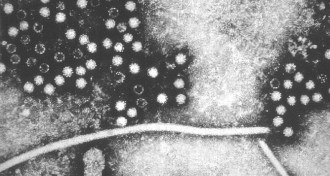 Health & Medicine
Health & MedicineHepatitis E widespread among English blood donors
Screening of 225,000 blood donations reveals a high prevalence of the hepatitis E virus.